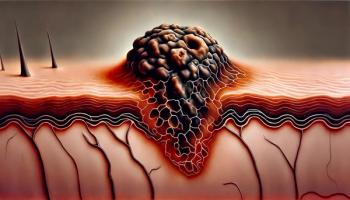
Immunotherapy, TriMixDC Combo Yielded Durable Melanoma Responses
The combination of TriMixDC-MEL and ipilimumab produced durable tumor responses in patients with pretreated advanced melanoma, according to a phase II study.
The combination of TriMixDC-MEL and the CTLA-4 inhibitor ipilimumab produced durable tumor responses in patients with pretreated advanced melanoma, according to a
TriMixDC-MEL, or autologous monocyte-derived dendritic cells (DCs) electroporated with synthetic mRNA, has been shown to have antitumor activity when given alone in patients with pretreated advanced melanoma.
This study of the combination treatment showed a disease control rate of 51% at 6 months.
“On the basis of our observations, combinations of autologous TriMix-DC therapy and checkpoint inhibitors deserve further evaluation in prospective clinical trials,” researchers led by Sofie Wilgenhof, of Universitair Ziekenhuis Brussels, Belgium, wrote in the Journal of Clinical Oncology.
The study included 39 patients with pretreated advanced melanoma who were assigned to treatment with TriMixDC-MEL plus ipilimumab (10 mg/kg every 3 weeks for four administrations followed by maintenance therapy every 12 weeks in patients who did not progress). The primary endpoint was 6-month disease control rate.
The overall tumor response rate (ORR) was 38%. Eight patients (20%) achieved complete response and seven patients (18%) achieved a partial response. With a median follow-up of 36 months, seven patients have maintained complete response and one patient maintained partial response.
“The observed antitumor activity compares favorably with the ORR observed with ipilimumab monotherapy in numerous prospective clinical trials in patients with pretreated advanced melanoma, and the observed frequency of complete responses is in range with the rate reported for the combination of ipilimumab and nivolumab,” the researchers wrote.
All patients experienced injection site skin reactions. In addition, safety data showed that the most common treatment-related effects included transient post-DC infusion chills (38%) and flu-like symptoms (84%). About one-third of patients experiences grade 3/4 immune-related adverse events.
At data analysis, 79% of patients had disease progression and 64% had died. The researchers calculated an estimated median progression-free survival of 27 weeks with a 3-year progression-free survival of 18%. The median overall survival was 59 weeks with a 3-year survival rate of 34%.
“These results were obtained despite the poor baseline prognostic factors of our study population,” the researchers noted. “Unlike previous studies with ipilimumab, 20% of patients had previously been treated for brain metastases, and more than half of all patients experienced prior progression on a BRAF inhibitor therapy.”
Newsletter
Stay up to date on recent advances in the multidisciplinary approach to cancer.



















































